Demonetisation and Agniveer reveal the two mindsets India has become.
In both these government schemes, one sees a desire to play the country like an orchestra anchored by conductor/conductors, argues Shyam G Menon.
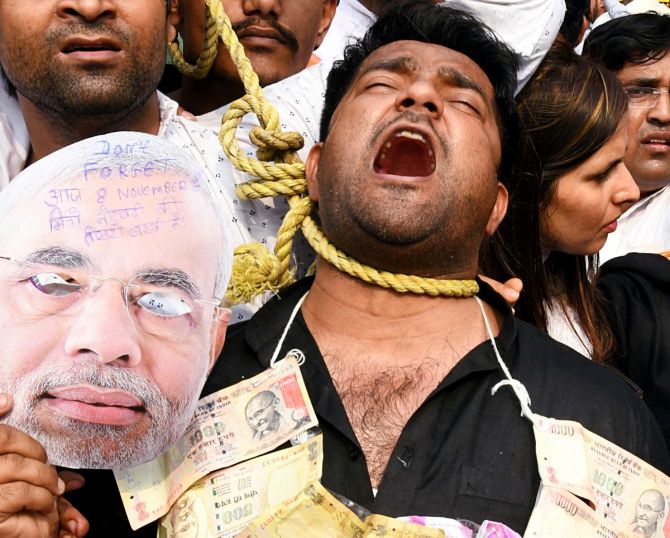
The Supreme Court's judgment on demonetisation
, delivered early January 2023, will be remembered for the lone instance of dissent it featured.
Given the irreversibility of all that happened as demonetiSation in November 2016, nobody expected an unscrambling of the scrambled egg.
People knew that nothing could be undone. Public interest in the lawsuits filed was more akin to knowing what the judiciary would say about demonetiSation given the elected government of the day appeared remorseless for what it put the electorate through.
DemonetiSation happened at very short notice and its immediate effect was people rushing to their banks to submit the currency notes withdrawn from circulation.
The queues before banks took a long time to disappear. Several people died.
Industrial production temporarily shrank as a consequence of demonetization. Jobs were lost.
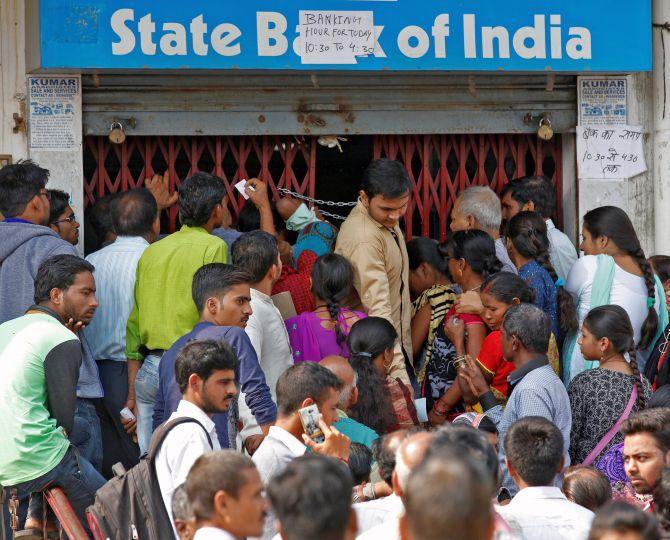
It was in the utter contrast of living in a democracy where government is of the people, by the people and for the people and yet having a predicament wherein the elected government acts in a shock-and-awe fashion; that the real disappointment of demonetisation lay.
In a way, the spectre of people, young and old, queued before banks for reasons they were yet to understand, mocked the contract between elected government and the electorate.
The public's interest in the Supreme Court's judgment was mainly driven by the eagerness to know what the learned judges would say on this angle.
The judgment, which concerned itself with the legality of the process and was passed on the strength of a 4:1 majority, would have disappointed those wishing for a demonetisation process hosting greater consultation and debate. The lone note of dissent provided hope.
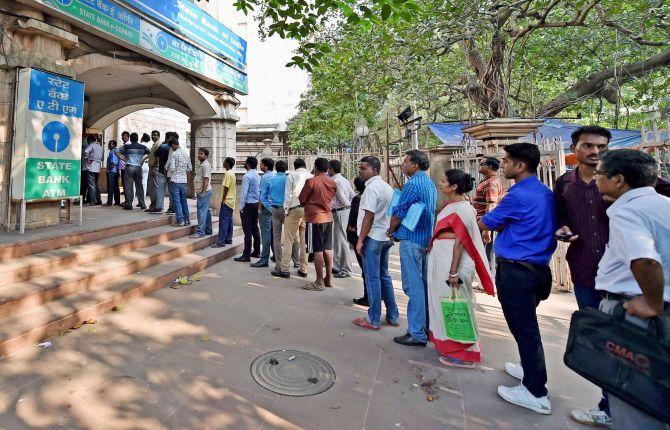
Two aspects about demonetisation continue to interest.
First, to the lay person (this columnist is one), the biggest visible impact demonetisation had was in encouraging the shift to digital transactions.
Making payments so is a critical part of the ingredients that go into making a digital ecosystem.
Large investments in building such an ecosystem, ranging from telecom infrastructure to various value-added services that can travel on those airwaves and optic fibres, had already been made in India by the second decade of the present century.
It surprised none that criticism of paper currency was gathering pace.
For decades the stuff of money for humankind, paper currency was increasingly faulted on several counts, including as medium of disease transmission.
Anything digital merited blind praise. Indeed, digital became synonymous with the future.
It was similar to marketing by that other ambassador of our future -- smart. Add smart to anything and the blend gains the aura of a very advanced existence.
In retrospect, some of these trends were timely.
A write-up from March 2021, available on the UNCTAD Web site, outlines the spike in e-commerce registered during the COVID-19 pandemic (it happened a bit over three years after demonetisation) and emphasises how digital capability has become crucial for countries to tap into the global marketplace.
But the question is -- does it mean we should put all eggs in one basket? Some among us -- basically those wishing to live without succumbing to evangelism of any sort -- realise that it is foolish to think of any ecosystem as infallible.
Paper currency was certainly undermined by crooks and mischievous elements. But it would be incorrect to conclude that such compromise hasn't happened in digital or worse, that it would never happen.
Given the nature of the human being, the cat and mouse game of advancement and subversion is inescapable. It will go on.
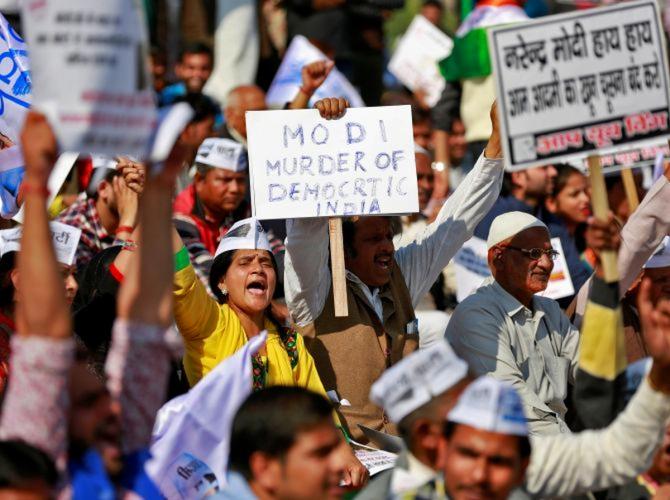
Second, what should engage us about demonetisation even after the Supreme Court ruling, is the pattern of government behaviour the whole exercise revealed.
To begin with, demonetisation affected something very close to the people -- their money.
When the government tampers with money, people will do whatever it takes to be on the correct side and safeguard their ability to transact.
After all, if one loses one's money and ability to transact, one risks losing one's ability to survive.
As demonetisation rolled out, the public had no choice but to line up at the banks.
It wasn't a time for questions; it was a time for compliance.
Meanwhile banks and their staff worked long hours to make sure that the people queuing up to surrender currency notes could do so.

Today, if the government chooses to call demonetisation a success, in the interest of fairness, they must admit that it succeeded because the move hit people where it mattered the most and the implementation could be enforced through legions of bank staff working diligently for the same.
In other words, if the bank staff hadn't worked the way they did and the public hadn't queued up, demonetisation would have been a dud.
This counts even more when explanations around the aptness of demonetization in 2016 seek refuge in the excuse that a scrambled egg cannot be unscrambled.
Those currently celebrating the court ruling as a 'big win' for the Modi government should remember that the Hindi word best encapsulating what everyone other than government, felt during those days of demonetisation is 'majboori (helplessness, absence of choice).'
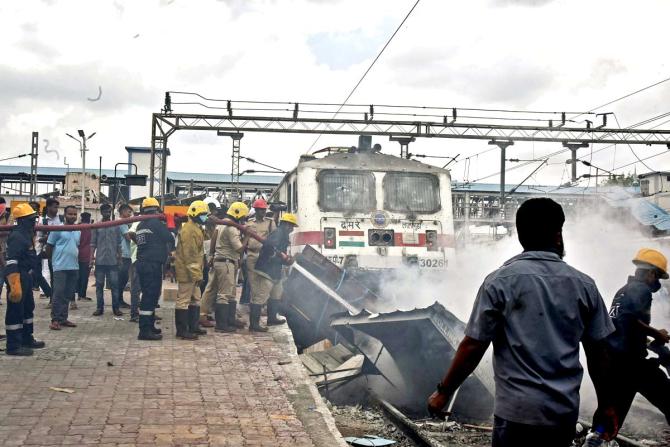
What should worry is how such majboori is being leveraged by government as a method of governance.
Many months after demonetisation, the much-debated Agniveer scheme of recruitment to the armed forces was mooted and later, it took off.
On the face of it, the two -- demonetisation and Agniveer -- would seem an incorrect comparison.
They are two entirely different fields; one is economy, the other is security.
While that may be so, the commonality is in the pattern of imagination. Like money, security is important.
Of all the institutions we have, the defence apparatus is most duty-bound to question less and implement orders as best as it can.
Retired defence officials have questioned the wisdom behind the Agniveer scheme.
Further, the way in which, the scheme uses the security establishment like a large finishing school shaping youngsters for employment once they are discharged from military service, and by doing so, discreetly bloats the share of people in a democracy partial to a military environment, has worried some.

However, none of these concerns alters the task before serving defence personnel, who are duty-bound to implement what the government decided. And they will do it well. As best as they can.
When that is done, the government will be able to look back on the Agniveer scheme and have its cohorts shout once again, 'big win'.
Any sense of majboori in the arrangement, will be buried and forgotten. Most likely, words like 'vision' and 'visionary' will prevail. This is the pattern.
At the risk of oversimplifying matters, demonetisation and Agniveer reveal the two mindsets India has become.
In both these government schemes, one sees a desire to play the country like an orchestra anchored by conductor/conductors.
One mindset caters to the strategically minded, constructor sort.
It applauds the schemes as an example of planning and implementation by government, which in turn is the substratum on which the great nations and empires of history would appear built.
The other sees the imagination behind these schemes as compromising the free, peaceful, socially modern existence it wished for. No prize for guessing which mindset, this author subscribes to.
Shyam G Menon is a Mumbai-based columnist.
Feature Presentation: Rajesh Alva/Rediff.com










